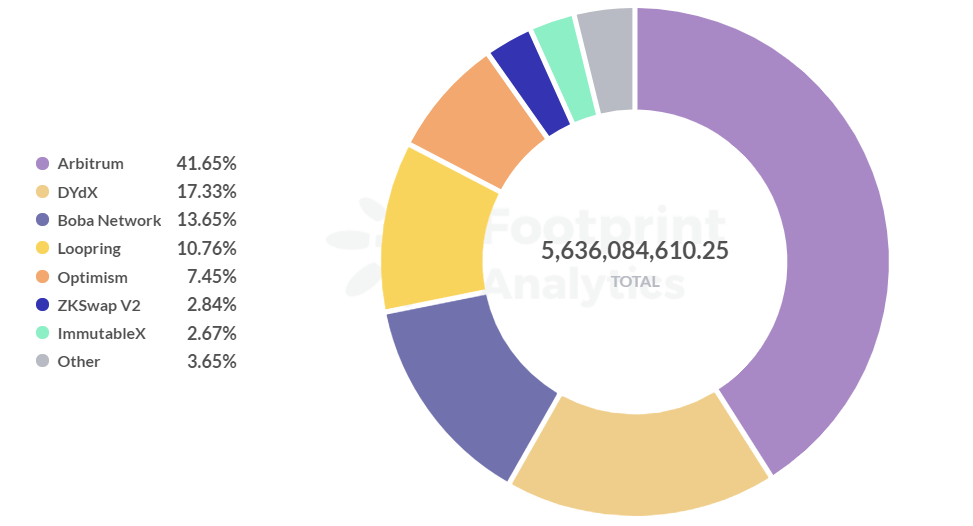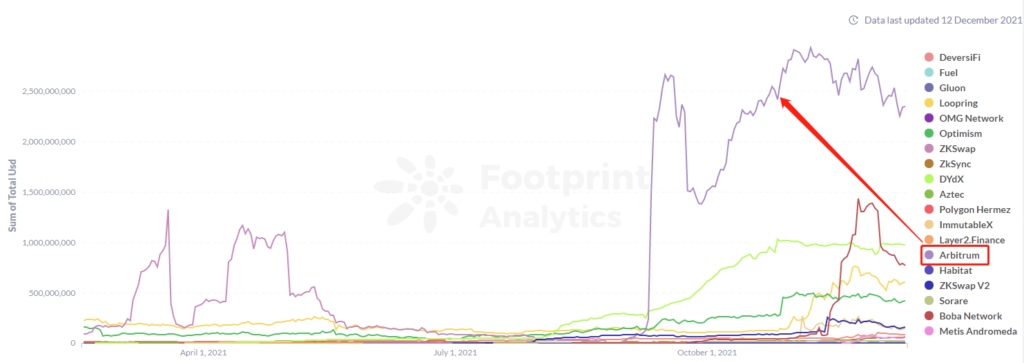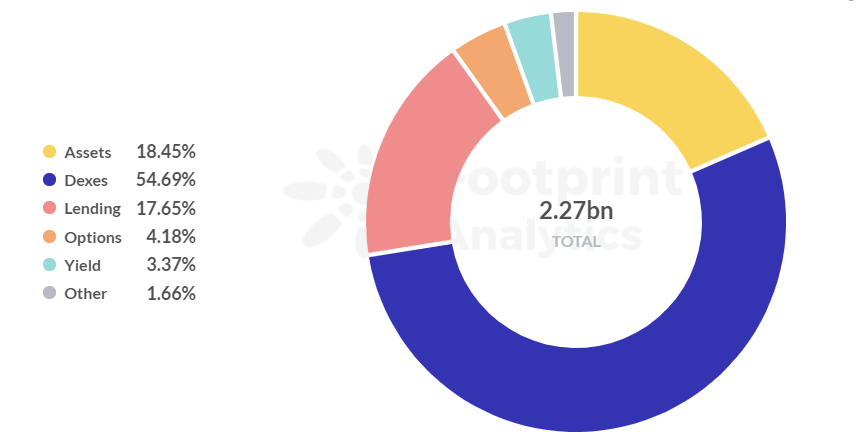Arbitrum, one of Ethereum’s Layer 2 networks, has gained significant attention from crypto users and developers since its launch. According to Footprint Analytics, Arbitrum has contributed 41.88% of all Layer 2 TVL, totaling $2.25 billion as of Dec. 8. Arbitrum is now the leading player of all Layer 2 networks.
 Data Source: Footprint Analytics – TVL Share by Layer 2
Data Source: Footprint Analytics – TVL Share by Layer 2
Arbitrum launched its main network on Sept. 1, 2021, which seems late compared to other Layer 2 networks. Despite this, Arbitrum’s TVL quickly overtook other projects, exceeding expectations.
 Data Source: Footprint Analytics – Layer 2 TVL Growth Trending
Data Source: Footprint Analytics – Layer 2 TVL Growth Trending
What makes Arbitrum stand out from the crowd?
Reason 1: Low technology migration costs
Arbitrum’s Optimistic rollups solution is more popular with developers in the short term than the more technically complex ZK rollups solution. In the long term, however, ZK rollups’ network may have the potential to catch up thanks to its faster speed and stronger security.
Reason 2: Low Gas fee cost
Arbitrum processes 40,000 transaction requests per second, much larger than Ethereum’s 15-30 requests, greatly reducing network congestion, increasing speed and reducing transaction costs. According to external data, Arbitrum’s transaction cost is 1.8 Gwei compared to Ethereum’s 64 Gwei, nearly 36 times that of Arbitrum.
Reason 3: A more open ecosystem
Many people may ask why the Optimistic network, which also uses the Optimistic rollups solution, is not as good as Arbitrum. Arbitrum’s launch strategy onboarded more than 400 DeFi projects before it opened to the public, and dozens of projects were already online at the same time at the start of its launch. This allowed users to complete a variety of operations in its ecosystem. Optimistic, on the other hand, uses a whitelisting mechanism, so that only whitelisted projects can be deployed on its main network.
Because of Arbitrum’s open deployment mechanism, it was not the head DeFi protocol that made Arbitrum famous, but rather the various “degen” investments—those offering unscrupulously high returns.
Arbitrum’s initial TVL growth is largely due to ArbiNYAN, which attracts investors to stake their native tokens with returns of 1000%-plus. These projects, while not always legitimate, allowed the new ecosystem to emerge.
Introduction to the Arbitrum ecosystem
Arbitrum has just 44 live projects, which is not particularly large. Among them, the DeFi category is dominated by DEX, lending and asset categories.
Of these, DEX accounts for 56% of TVL, assets for 18% and lending for 17.8%.
 Data Source: Footprint Analytics – TVL Share of Category On Arbitrum
Data Source: Footprint Analytics – TVL Share of Category On Arbitrum
Looking at the TVL ranking of DeFi projects, degen projects are no longer in the top 5, with mainstream projects rising to the top. Curve is in first place with a TVL of $420 million.
 Data Source: Footprint Analytics – Top 5 DeFi Protocols on Arbitrum
Data Source: Footprint Analytics – Top 5 DeFi Protocols on Arbitrum
Conclusion
Arbitrum, a key player in the expansion of Ethereum, is already attracting a lot of capital attention, with $124 million in Series A and B funding and a valuation of $1.2 billion. Arbitrum is not currently in a cryptocurrency launch, and the co-founder of its development team, Offchain Labs, has stated that there are no plans to launch a cryptocurrency in the near future.
Arbitrum is still in its early stages and we expect it to continue to enrich its ecosystem and attract more developers and investors.
This report was brought to you by Footprint Analytics.
What is Footprint
Footprint Analytics is an all-in-one analysis platform to visualize blockchain data and discover insights. It cleans and integrates on-chain data so users of any experience level can quickly start researching tokens, projects and protocols. With over a thousand dashboard templates plus a drag-and-drop interface, anyone can build their own customized charts in minutes. Uncover blockchain data and invest smarter with Footprint.
The post 3 reasons why Arbitrum TVL leads in Ethereum layer 2 appeared first on CryptoSlate.